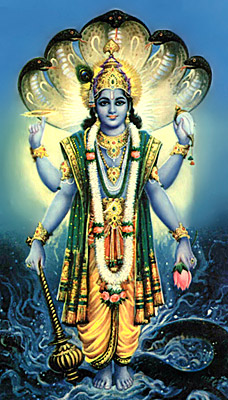 Purusha in the Rig Veda is equated with Lord Vishnu. The Purusukta which is included in the tenth mandala establishes decisively that Purusa who is equated with Vishnu is the Supreme Being. It is extolled as the most important Vedic passage by the Pancaratra Samhitas and the Puranas because it expounds the doctrine of the ultimate Reality as enunciated in the Upanishad. This sukta is found in all the four Vedas and is, therefore, regarded as a scriptural text of greater authority. Though there is no mention of Vishnu by name, the term purusha is interpreted by all the commentators as referring to Vishnu or Narayana.
Purusha in the Rig Veda is equated with Lord Vishnu. The Purusukta which is included in the tenth mandala establishes decisively that Purusa who is equated with Vishnu is the Supreme Being. It is extolled as the most important Vedic passage by the Pancaratra Samhitas and the Puranas because it expounds the doctrine of the ultimate Reality as enunciated in the Upanishad. This sukta is found in all the four Vedas and is, therefore, regarded as a scriptural text of greater authority. Though there is no mention of Vishnu by name, the term purusha is interpreted by all the commentators as referring to Vishnu or Narayana.
According to the etymological meaning as provided by Vishnu Smriti and Padma Purana, the letter `puh` means the abode in the form of physical body, and the letter `sa` means the one who dwells in it. The Prashnopanishad states that Purusa or the one who dwells in the body (purisayam purusha) is the highest Being, Brahman. The Brhadaranyaka Upanishad uses the term Purusa in the sense of Brahman. The Subala Upanishad identifies the term Purusa with Narayana. The Satapatha Brahman also uses the word Purusa as synonymous with Narayana. It designates Purusha sukta as Narayarta-sukta. In the Taittiriya Upainisad which is a part of Taittiriya Aranyaka, Purusa referred to in Purusa-sukta is identified with Narayana. It also explicitly mentions that Narayana is Para Brahma, to be meditated upon for moksha. The Padma Purana identifies Purusha with Vasudeva. According to the Taittiriya Aranyaka, the passage following immediately after Purusa sukta, which is designated as uttara narayana by Satapatha Brahmana, mentions that Sri (meaning Bhu devi) and Goddess Laxmi are the consorts of the Purusa referred to in the earlier part of Purusa sukta. The explicit mention of the Goddess Laxmi and Bhu as consorts rules out the possibility of taking Purusa of Purusa sukta as any other deity such as Chaturmukha Brahma, Lord Vishwakarma and Prajapati and thereby establishing the fundamental tenet of Vaishnavism that Sriyah pati or Vishnu as associated with Sri is the Supreme Deity. The Purusa sukta of the Rig Veda covers briefly the fundamental concepts of Vaishnavism that Vishnu or Narayana is the Supreme Deity (paratattva), He is both immanent and transcendent, He is the creator of the universe and He is the sole object of meditation (upasana) for attaining moksha.









